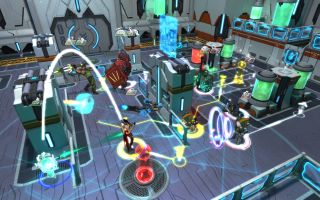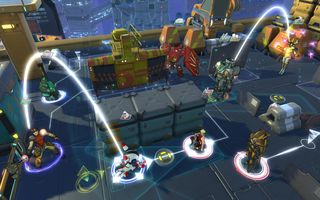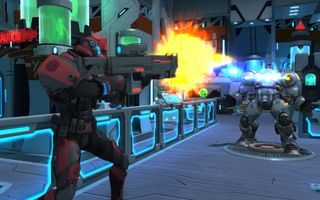
We can’t all compete when it comes to actions per minute—the MOBAs, FPS titles and RTS behemoths of today all require the sorts of clinical, second-by-second precision that isn’t always within reach of players. Step forward Atlas Reactor, a new take on the turn-based tactics genre that bridges the gap between non-stop APM-heavy games and the slow, methodical turn-based strategy giants that have come before.
One seemingly simple change to the established order has broken through the limitations of the turn-based genre with Atlas Reactor. By making turns simultaneous, the game is no longer about the APM of something like DOTA, nor is it something where players have a perfect knowledge of the playing field when making their move, like Chess. Instead, Atlas Reactor allows each player – all eight of them, in a 4v4 setup—20 seconds in which to plan and decide upon their move; when the time is up, each player will take their turn at the same time.
This takes Atlas Reactor into a unique direction in gaming, closer to something like American Football than your traditional PC gaming fare, with players deciding on their strategy while at the same time trying to anticipate what the opposition will do. Predicting your enemies moves, bluffing successfully and countering their strategies on the fly are all critical to victory, and present players with a whole new world of tactical gaming to learn.

Put simply, turns are made up of ‘decision mode’—the 20 seconds where all players choose what they’re actually going to do—and ‘resolution mode’. This latter mode is split into four distinct phases—prep, dash, blast and move. Prep sees players laying traps, engaging shields or buffing themselves/each other. The dash phase has players who have opted to dodge or charge take their action. The blast phase, as you might guess, has any shooting, blasting or stationary attacks planned engaged. Finally, the move phase sees any characters taking a prep or blast action able to move to a new location—and those not taking any actions able to sprint up to twice their normal movement range.
During turns players are able to set waypoints, for example to avoid traps, follow allies, chase enemies and other such extra options. All of this comes together in one giant ball of quick-thinking, not APM-reliant strategy that tasks players with learning a host of new, and exciting, skills.
The world of Atlas Reactor is one made up of ‘freelancers’ – each a character/class you can choose to take on your opponents. These freelancers work under the eye of the megacity Atlas’ powerful ‘Trusts’. These organisations control the whole megacity and are the people—and things—you need to keep on the good side of if you want access to the Atlas Reactor! This piece of technology from a golden age of scientific genius is the lifeblood of everything in Atlas. Your job is to keep it running—at least, that’s what the Trusts say.

Each of the freelancers you control has his, her or its different personality, skills and abilities. Falling into three categories – firepower, the damage dealers, frontline, the tanks, and support, the… well, support units – players can choose from a growing range of almost 20 different heroes, villains, beasts and entities; all of which can have their look customised to make your freelancer truly your own.
Naturally, when you’re looking at something described at ‘DOTA meets XCOM’, you’ll need a bit of time to acclimatise to the experience. While playing is the best way to learn, Trion has also put together a handy beginner’s guide to help ease players in to this genre-breaking method of playing a strategy game.
Atlas Reactor is available now in a number of different versions to suit your bank balance—from the free-to-play basic version, with a limited rotation of characters, through the All Freelancers Edition, which comes with all characters for £22.99, and on to the Ultimate Reactor Edition, which comes with dozens of additional extras for £79.99. More information on Atlas Reactor is available in the official FAQ.
PC Gamer Newsletter
Sign up to get the best content of the week, and great gaming deals, as picked by the editors.
